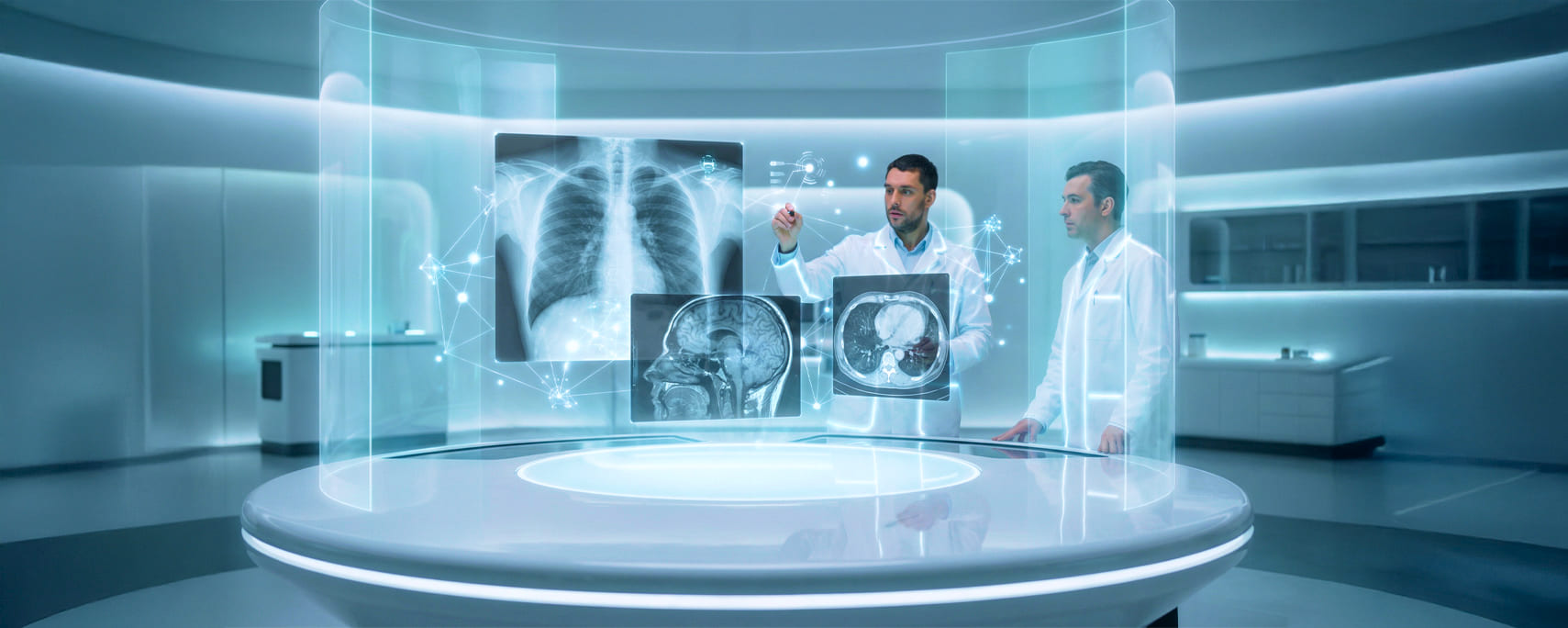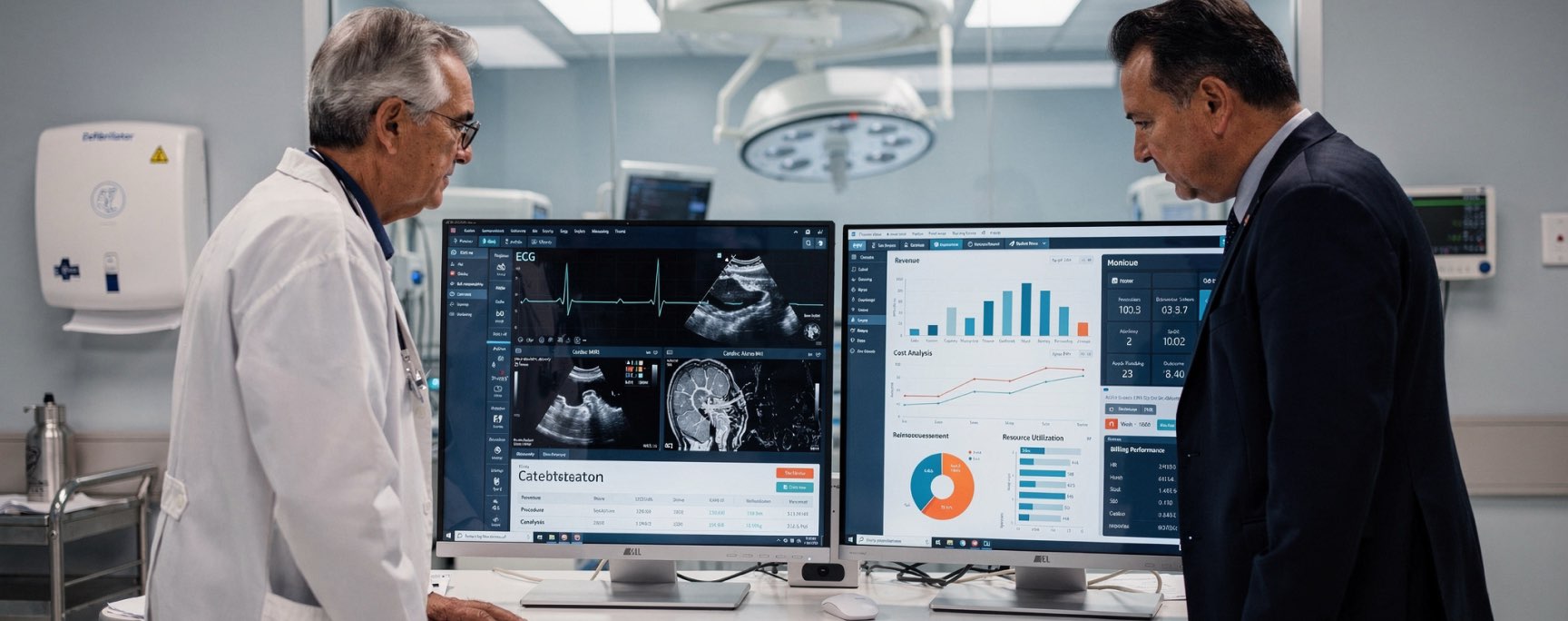Machine Learning vs AI in Healthcare: Impact, Challenges, and Future
Introduction
Artificial Intelligence (AI) and Machine Learning (ML) have become cornerstones of technological advancement, driving innovation across industries. Despite their frequent use, these terms are often misunderstood or used interchangeably, obscuring the distinct roles each plays in shaping modern solutions.
While AI encompasses the broader concept of creating machines capable of simulating human intelligence, ML focuses on enabling systems to learn and improve from data without explicit programming. This distinction is particularly significant in the healthcare industry, where these technologies are revolutionizing everything from patient care to operational efficiency. In talks about tech’s future, we must know the differences between Machine Learning vs AI. This clarity affects how we develop and use innovations in various sectors.
In this article, we provide a detailed comparison of AI and ML, with a special focus on their applications in healthcare. From diagnostic tools powered by AI to predictive analytics driven by ML, we explore how these technologies are addressing critical challenges, enhancing patient outcomes, and shaping the future of medical innovation.
What is Artificial Intelligence (AI)?
Artificial Intelligence refers to the broader concept of machines or systems that mimic human intelligence to perform tasks. AI is designed to process information, make decisions, and solve problems in ways that would traditionally require human intelligence. In healthcare, AI is already being utilized to automate various processes, enhance decision-making, and improve clinical outcomes.
For instance, AI-powered diagnostic tools analyze medical imaging to detect abnormalities like tumors with remarkable precision. Virtual assistants, such as chatbots, help streamline patient interaction, and robotic surgery systems assist surgeons with complex procedures. The potential of AI in healthcare extends beyond diagnostics to areas such as drug discovery, patient monitoring, and even administrative tasks, improving both efficiency and accuracy.
As the demand for AI-driven solutions grows, companies are also exploring AI for product development and artificial intelligence development services to build advanced systems that further enhance healthcare delivery.
What is Machine Learning (ML)?
Machine Learning is a subset of AI focused on developing algorithms that allow systems to learn from data and improve over time without explicit programming. Instead of being programmed with specific instructions, ML systems use historical data to identify patterns and make predictions or decisions.
In healthcare, Machine Learning plays a pivotal role in areas such as predictive analytics, disease detection, and treatment recommendations. For example, ML algorithms can analyze patient data to predict the likelihood of developing chronic conditions like diabetes or cardiovascular diseases. They can also personalize treatment plans based on individual patient data, improving outcomes and reducing costs.
Unlike traditional methods, ML enables healthcare providers to make data-driven decisions with greater accuracy, helping patients receive tailored care. Additionally, organizations are increasingly turning to machine learning as a service and machine learning consulting services to leverage the full potential of these advanced technologies in their healthcare solutions.
Optimize Your Business with AI & ML Expertise.
Maximize efficiency and reduce costs by leveraging AI and ML solutions tailored to your needs!
Get in touchMachine Learning vs AI: Top 4 Key Differences
-
Definition and Scope
Artificial Intelligence (AI) is a broad field of computer science aimed at creating machines that can perform tasks typically requiring human intelligence, such as reasoning, decision-making, and problem-solving. Machine Learning (ML), on the other hand, is a subset of AI focused on enabling machines to learn from data and improve over time without being explicitly programmed for every task.
-
Learning Process
AI systems rely on algorithms that follow predefined rules and logic to perform specific tasks. In machine learning vs AI, algorithms learn from data and become more accurate as they are exposed to more examples. This learning process allows ML systems to adapt to new patterns and make data-driven decisions without human intervention.
-
Application in Healthcare
AI is typically used for tasks requiring human-like reasoning, such as virtual health assistants or robotic surgeries. ML, however, is more focused on analyzing large datasets, identifying trends, and making predictions. In healthcare, ML is commonly used to predict patient outcomes, while AI is applied to tasks like image recognition or clinical decision support systems.
-
Static vs. Dynamic
AI systems are often more static, programmed to handle specific scenarios, while ML is dynamic, adapting and improving as more data is introduced. This makes ML particularly effective in areas like predictive analytics and personalized medicine, where evolving data continuously shapes recommendations and decisions.
The Impact of AI and ML on Healthcare Innovation

-
Improved Diagnostics
AI technologies, particularly deep learning algorithms, have revolutionized diagnostic accuracy in healthcare. For example, AI can analyze medical images such as CT scans or X-rays to identify diseases like cancer or cardiovascular conditions more accurately and at a faster rate than human experts, ultimately leading to earlier detection and treatment. This advancement is driving innovation in AI for product development, with companies using these technologies to create more efficient diagnostic tools that enhance patient care and outcomes.
-
Personalized Treatment
Machine Learning is a key driver of personalized medicine. By analyzing patient data, including medical history, genetics, and lifestyle factors, ML algorithms can predict which treatments will be most effective for individual patients. This leads to more tailored and precise care, improving patient outcomes and reducing unnecessary treatments. Many healthcare organizations want to use these technologies. So, they are turning to machine learning as a service. It will integrate advanced algorithms into their systems. This will enhance their ability to provide personalized, data-driven care.
-
Operational Efficiency
AI and ML are improving operational efficiencies within healthcare systems. AI is being used for administrative tasks like scheduling, billing, and patient intake, reducing the workload on healthcare professionals. ML, on the other hand, helps optimize hospital resource allocation by predicting patient admission rates, ensuring that staffing and resources are aligned with demand.
-
Clinical Decision Support
AI-driven clinical decision support systems (CDSS) are helping healthcare providers make more informed decisions. These systems analyze a patient’s medical history and other relevant data to provide recommendations for diagnosis, treatment options, and care plans. Machine learning consulting services are also playing a crucial role by helping healthcare organizations implement these advanced systems effectively. ML further contributes by predicting patient outcomes, allowing healthcare providers to intervene early and reduce complications.
Machine Learning vs AI: Challenges in Healthcare Adoption

-
Data Privacy and Security
Healthcare data is highly sensitive, and AI and ML adoption face significant hurdles due to privacy and security concerns. Regulations such as HIPAA require stringent safeguards to protect patient data. Ensuring that AI and ML systems comply with these regulations is a major challenge for healthcare providers and tech developers alike.
-
Data Fragmentation and Standardization
Healthcare systems often have fragmented data stored in various formats across multiple platforms. This lack of standardization makes it difficult to create comprehensive datasets for training AI and ML models. Without uniform data structures, integrating AI and ML technologies into healthcare systems becomes complex and time-consuming.
-
Algorithmic Bias and Ethics
AI and ML algorithms are only as good as the data they are trained on. If the training data is biased or unrepresentative of the broader population, it can lead to algorithmic bias, potentially making unfair or inaccurate decisions. Addressing these biases and ensuring that AI systems are ethically sound is essential for their widespread adoption in healthcare.
-
Adoption Resistance and Trust
Healthcare professionals are often hesitant to trust AI and ML systems, especially when it comes to clinical decision-making. There is a concern that these technologies might override human judgment or lead to errors. Building trust in AI and ML technologies requires transparency, accuracy, and integration that complements the expertise of healthcare providers rather than replacing it. Artificial intelligence development services ensure systems align with clinical needs, building trust among healthcare professionals.
-
Infrastructure and Costs
The cost of implementing AI and ML technologies in healthcare can be prohibitive, particularly for smaller healthcare institutions. In addition to high upfront costs, healthcare providers need the right infrastructure, including sufficient computing power and data storage, to effectively implement and maintain these systems. Securing funding and resources is a key barrier to the widespread use of AI and ML in healthcare.
The Future of AI and ML in Healthcare
The future of AI and ML in healthcare is filled with exciting possibilities. As technology continues to evolve, we can expect more refined algorithms, capable of providing even more precise diagnoses and personalized treatments. AI’s ability to analyze unstructured data, such as medical records and research articles, is also set to accelerate medical discoveries and improve clinical decision-making.
Moreover, AI and ML are expected to play crucial roles in public health initiatives, such as predicting disease outbreaks and optimizing healthcare resource allocation. Continuous improvements in ML models will allow them to adapt more effectively to real-time data, enabling healthcare providers to offer more responsive and dynamic care.
In the long term, AI and ML have the potential to create a more efficient, accessible, and patient-centered healthcare system one that leverages the power of data to deliver better outcomes and drive innovation across the sector.
Conclusion
To conclude, while Artificial Intelligence and Machine Learning are often used interchangeably, they serve distinct but complementary roles in healthcare. The discussion of Machine Learning vs AI highlights how AI’s ability to simulate human decision-making is transforming clinical practices, while ML’s data-driven learning is helping predict outcomes and personalize care.
Together, these technologies are creating groundbreaking innovations that are revolutionizing the healthcare landscape.
Understanding their unique contributions is crucial for healthcare professionals, technology developers, and policymakers as they work together to harness the full potential of AI and ML.
If you’re ready to explore how AI and ML can elevate your healthcare solutions, contact our experts to learn how we can help you innovate and drive results.
About Dash

Dash Technologies Inc.
We’re technology experts with a passion for bringing concepts to life. By leveraging a unique, consultative process and an agile development approach, we translate business challenges into technology solutions Get in touch.







